|
|
|
Sort Order |
|
|
|
Items / Page
|
|
|
|
|
|
|
| Srl | Item |
| 1 |
ID:
106670
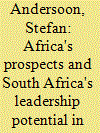

|
|
|
|
|
| Publication |
2011.
|
| Summary/Abstract |
This article examines Africa's role in an evolving international system where powerful emerging markets, such as bric, together with established powers are shaping economic trajectories. The specific focus is on South Africa as an aspiring leader on the African continent, and on its potential for becoming an emerging market shaping the global order together with bric and the West. It is unclear whether a changing global economy in which the postcolonial world plays a greater role will result in improved developmental prospects for Africans as African countries gradually reorient themselves from the West to the South, or whether relations with emerging markets will resemble neo-colonial ties with the West. South Africa's structural weakness, stemming from serious domestic problems of a social, political and economic nature, threatens to undermine its standing in Africa and its emerging market status.
|
|
|
|
|
|
|
|
|
|
|
|
|
|
|
|
| 2 |
ID:
106662
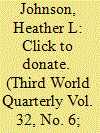

|
|
|
|
|
| Publication |
2011.
|
| Summary/Abstract |
This article investigates the role of visual representation through images in the international refugee regime, with a particular focus on the female refugee. I argue that visual representation illustrated by the photo archives of the unhcr in particular, but also in other institutional sources, plays a crucial role in shaping our imaginations and knowledges, and that its dynamics are important in understanding the politics of asylum. As the international refugee regime institutionalised by the unhcr has developed, the imagination of the refugee has undergone three concurrent shifts: racialisation, victimisation and feminisation. Each of these shifts has contributed to changing policies and practices in the regime, particularly the change in 'preferred solution' from integration to repatriation or, where possible, prevention. More importantly, these shifts have all operated within a discourse of depoliticisation of the refugee, denying the figure of the refugee the capacity for political agency. This depoliticisation works through the construction of the 'female' refugee, indicating important lessons for our understandings of the political agency of both women and non-citizens.
|
|
|
|
|
|
|
|
|
|
|
|
|
|
|
|
| 3 |
ID:
106661
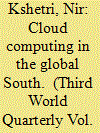

|
|
|
|
|
| Publication |
2011.
|
| Summary/Abstract |
Cloud computing has started to transform economic activities in the global South. Many businesses are taking advantage of the pay-as-you-go model of the technology, and its scalability and flexibility features, and government agencies in the South have been investing in cloud-related mega-projects. Cloud-based mobile applications are becoming increasingly popular and the pervasiveness of cellphones means that the cloud may transform the way these devices are used. However, findings and conclusions drawn from surveys, studies and experiences of companies on the potential and impact of cloud computing in the developing world are inconsistent. This article reviews cloud diffusion in developing economies and examines some firms in the cloud's supply side in these economies to present a framework for evaluating the attractiveness of this technology in the context of evolving needs, capabilities and competitive positions. It examines how various determinants related to the development and structure of related industries, externality mechanisms and institutional legitimacy affect cloud-related performances and impacts.
|
|
|
|
|
|
|
|
|
|
|
|
|
|
|
|
| 4 |
ID:
106667
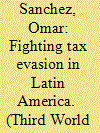

|
|
|
|
|
| Publication |
2011.
|
| Summary/Abstract |
In the 1990s both Chile and Argentina embarked on efforts to tackle tax evasion. The strategies they pursued differed substantively: Argentina followed a coercive approach that created an elite audit team endowed with special legal powers, while Chile undertook a less spectacular service-oriented approach that improved the fiscal pact between state and society and enacted tax administration reform. Chile succeeded in permanently lowering tax evasion levels, while Argentina's success was short-lived and evasion levels soon returned to previous heights. Besides important differences in the institutional strength of these countries, the contrasting outcomes can be attributed in no small measure to the different strategies adopted. Their experience can provide some useful lessons in the elusive battle against tax evasion in Latin America.
|
|
|
|
|
|
|
|
|
|
|
|
|
|
|
|
| 5 |
ID:
106665
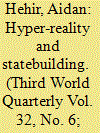

|
|
|
|
|
| Publication |
2011.
|
| Summary/Abstract |
A characteristic feature of many contemporary international administrations of post-conflict territories has been the reluctance of the administrating body to rescind its competences. International administrations have legitimatised their maintenance of key competences on the basis that the societies they administer have yet to achieve stipulated benchmarks indicative of a capacity for complete self-government. This paper offers a post-structuralist analysis of the unwillingness of international administrations to cede control to local institutions and draws in particular on Jean Baudrillard's theory of hyper-reality. Baudrillard identified the means by which, as part of a process of self-identification, a simulated world has come to replace reality and our perception of things has become corrupted by a perception of a reality that never existed. Thus entities and phenomena are imbued with characteristics they do not and cannot have, yet are treated as though they do. In the context of statebuilding this has been manifest in the desire to create political communities which mirror an idealised and unreal vision of the Western state.
|
|
|
|
|
|
|
|
|
|
|
|
|
|
|
|
| 6 |
ID:
106666
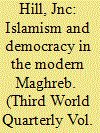

|
|
|
|
|
| Publication |
2011.
|
| Summary/Abstract |
This paper examines the legitimacy of the restrictions the Moroccan and Algerian governments have placed on democracy in their countries. In each case the democratic process is subject to a range of limitations. These controls are justified on the grounds that they help prevent Islamist parties from winning power and that, if in government, these parties would roll back many of the political and civil rights enjoyed by Moroccan and Algerian citizens. Yet is this the case? By looking at the pjd's and msp's manifesto pledges from the most recent parliamentary elections, the paper uncovers a different attitude. Far from opposing democracy and the various rights and liberties commonly associated with it, the pjd and msp are working to strengthen it. Their commitment to democracy has grown, not diminished, over the past decade.
|
|
|
|
|
|
|
|
|
|
|
|
|
|
|
|
| 7 |
ID:
106664
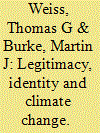

|
|
|
|
|
| Publication |
2011.
|
| Summary/Abstract |
Resource scarcity and climate change could provoke major inter-state and intra-state violence and humanitarian emergencies, an especial threat to the global South. This article examines the dynamics that have followed the major violent crises of the past few centuries to determine whether climate-change-induced conflict might paradoxically generate norms of non-violence and collective identification, and in turn lead to a more co-operative culture of anarchy. Especially since 1945 we have witnessed the development of a 'security community' in the North Atlantic-that is, a group of states that not only resolve conflict without resort to violence but also consider war among their members unthinkable. Such communities might develop in other regions in two stages. First, state internalisation of liberal norms of democracy and human rights may enhance the role of intergovernmental organisations in mitigating climate-change-induced conflict. Second, collective identification among states and individuals may be stimulated by structural similarity between increasingly democratic states, the perception of a common fate arising from shared threats, and an expanding global civil society and epistemic communities preoccupied with climate change. Climate change could thus spur movement towards more legitimate and authoritative intergovernmental organisations within a world society that would be more effective at solving common problems than those operating within today's more fragmented international society.
|
|
|
|
|
|
|
|
|
|
|
|
|
|
|
|
| 8 |
ID:
106663


|
|
|
|
|
| Publication |
2011.
|
| Summary/Abstract |
As successors to structural adjustment programmes, Poverty Reduction Strategy Papers (prsps) were introduced in 1999 as preconditions for World Bank and imf concessional financing and for debt relief. prsps now serve as the basis of negotiations for a variety of development financing and have influenced the design of other aid instruments. This paper considers the impact of the prsp framework on the constitution of global economic governance, in particular its effect in foreclosing possibilities for a radical revision of the rules and institutions of international economic law. The paper argues that the prsp project not only reframes fundamental tenets of international co-operation and global communal responsibility but also establishes a new disciplinary framework for Third World state engagement with the global economy and the international law which sustains it. In this way the discourse and methods of resistance against the injustices of the international order have been appropriated to distil such dissent through qualified operationalising of contestable notions of 'participation', 'ownership', 'partnership' and 'poverty reduction', disabling the resurgence of any form of emancipatory politics in the international economic order, whether through a state-led nieo-style revival or cosmopolitan social movement.
|
|
|
|
|
|
|
|
|
|
|
|
|
|
|
|
| 9 |
ID:
106668
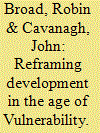

|
|
|
|
|
| Publication |
2011.
|
| Summary/Abstract |
This article argues that the contemporary triple crises of finance, food and environment, which have shaken the global economy since 2008, have exposed what should be seen as the Achilles heel of the dominant development theory and practice of the past 30 years: vulnerability. We argue that the crises not only add momentum to the delegitimisation of the old model, but also offer legitimacy for paths that lessen vulnerability and increase what we call 'rootedness' (a term we prefer to 'resilience' or 'sustainability'). After offering a brief history of 'vulnerable' development and reviewing the literature on vulnerability from the development, economic and environmental fields, we use this vulnerability versus rootedness frame to present analysis from our field work in two 'vulnerable' countries: the Philippines and Trinidad and Tobago. Integrating the article's sections, we then propose a new interdisciplinary framework for development that builds on and supplements the human rights, ecological, equity and democracy frames: the notion of 'rootedness' at the household, local and country levels.
|
|
|
|
|
|
|
|
|
|
|
|
|
|
|
|
| 10 |
ID:
106669
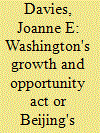

|
|
|
|
|
| Publication |
2011.
|
| Summary/Abstract |
Growing criticism of Chinese engagement in Africa centres on the risk to African development posed by China's aggressive export policies and the threat to the Washington Consensus and African governance posed by China's 'non-interference' approach to engagement. This article challenges both these assumptions. The growth of Chinese trade has a wide range of impacts, depending on the sector in question, and the current terms of trade Washington extends to Africa under the auspices of the agoa do not result in uniformly beneficial effects. With regard to African governance, it is argued that the 'Washington Consensus' has been based on competing and often muddled perceptions of US national interest. This fact tempers the regret felt at Washington's loss of influence over the good governance agenda. Evidence is provided to show that China can work within properly regulated countries and industries, if the African governments in question can provide fair, efficient and transparent environments in which to operate.
|
|
|
|
|
|
|
|
|
|
|
|
|
|
|
|
|
|
|
|
|